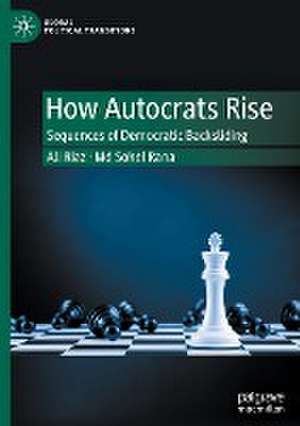How Autocrats Rise: Sequences of Democratic Backsliding: Global Political Transitions
Autor Ali Riaz, Md Sohel Ranaen Limba Engleză Hardback – 14 ian 2024
Preț: 713.70 lei
Preț vechi: 870.36 lei
-18% Nou
Puncte Express: 1071
Preț estimativ în valută:
136.58€ • 142.29$ • 113.56£
136.58€ • 142.29$ • 113.56£
Carte tipărită la comandă
Livrare economică 11-25 februarie 25
Preluare comenzi: 021 569.72.76
Specificații
ISBN-13: 9789819975792
ISBN-10: 9819975794
Pagini: 189
Ilustrații: XIII, 189 p. 12 illus., 10 illus. in color.
Dimensiuni: 148 x 210 mm
Greutate: 0.4 kg
Ediția:1st ed. 2024
Editura: Springer Nature Singapore
Colecția Palgrave Macmillan
Seria Global Political Transitions
Locul publicării:Singapore, Singapore
ISBN-10: 9819975794
Pagini: 189
Ilustrații: XIII, 189 p. 12 illus., 10 illus. in color.
Dimensiuni: 148 x 210 mm
Greutate: 0.4 kg
Ediția:1st ed. 2024
Editura: Springer Nature Singapore
Colecția Palgrave Macmillan
Seria Global Political Transitions
Locul publicării:Singapore, Singapore
Cuprins
Introduction: ‘Despots masquerading as democrats’.- Chapter 1: What is Democracy?.- Chapter 2: How Democracy Backslides?.- Chapter 3: Processes and sequences of backsliding.- Chapter 4: Four cases of backsliding and the rise of autocrats.- Conclusion: What did we learn?.
Notă biografică
Ali Riaz is a Distinguished Professor of political science at Illinois State University, USA, a Non-resident Senior Fellow of Atlantic Council, and the President of the American Institute of Bangladesh Studies. Riaz previously taught at universities in Bangladesh, England, and South Carolina, USA, worked as a Broadcast Journalist at the British Broadcasting Corporation (BBC) in London, and served as a Visiting Researcher at the Varieties of Democracy Institute (V-Dem) at Gothenburg University in Sweden and as a Public Policy Scholar at the Woodrow Wilson International Center for Scholars at Washington D.C.
Md Sohel Rana is an Associate Instructor of Political Science and a PhD student at Indiana University, USA. He earned his Master of Science (M.S.) in Political Science from Illinois State University, USA. His research interests include democratic and authoritarian politics and South Asian politics. His recent publications include “Democracy Deficit in the D-8” (with Ali Riaz) in Ahmed M Khalid et al. eds. Economic Integration Among D-8 Muslim Countries (2023), and “The God Gap? Public Perception on Religion-Politics Mix in South Asia” in Ali Riaz ed. Religion and Politics in South Asia (2nd ed., 2021).
Md Sohel Rana is an Associate Instructor of Political Science and a PhD student at Indiana University, USA. He earned his Master of Science (M.S.) in Political Science from Illinois State University, USA. His research interests include democratic and authoritarian politics and South Asian politics. His recent publications include “Democracy Deficit in the D-8” (with Ali Riaz) in Ahmed M Khalid et al. eds. Economic Integration Among D-8 Muslim Countries (2023), and “The God Gap? Public Perception on Religion-Politics Mix in South Asia” in Ali Riaz ed. Religion and Politics in South Asia (2nd ed., 2021).
Textul de pe ultima copertă
For the past decade and a half, the world has witnessed a precipitous decline of democratic countries and the consequent rise of autocrats. How Autocrats Rise: Sequences of Democratic Backsliding challenges the conventional wisdom and offers an institutional-ideological approach to understand the phenomenon, examines the steps of emergent autocrats, and analyzes the methods of legitimizing their rules. Employing the new framework, the book provides incisive analyses of four countries located in four different regions with dissimilar national features – Bangladesh, Bolivia, Hungary, and Turkey, and demonstrates that political developments in these countries have followed a similar, specific pattern resulting in various shades of autocracy. Theoretically enriched and empirically grounded, this exceptionally timely book makes significant contribution to the democratic backsliding literature while offering insights on how to forestall an autocratic era.
AliRiaz is a Distinguished Professor of political science at Illinois State University, USA, a Non-resident Senior Fellow of Atlantic Council, and the President of the American Institute of Bangladesh Studies. Riaz previously taught at universities in Bangladesh, England, and South Carolina, USA, worked as a Broadcast Journalist at the British Broadcasting Corporation (BBC) in London, and served as a Visiting Researcher at the Varieties of Democracy Institute (V-Dem) at Gothenburg University in Sweden and as a Public Policy Scholar at the Woodrow Wilson International Center for Scholars at Washington D.C.
Md Sohel Rana is an Associate Instructor of Political Science and a PhD student at Indiana University, USA. He earned his Master of Science (M.S.) in Political Science from Illinois State University, USA. His research interests include democratic and authoritarian politics and South Asian politics. His recent publications include “Democracy Deficit in the D-8” (with Ali Riaz) in Ahmed M Khalid et al. eds. Economic Integration Among D-8 Muslim Countries (2023), and “The God Gap? Public Perception on Religion-Politics Mix in South Asia” in Ali Riaz ed. Religion and Politics in South Asia (2nd ed., 2021).
Md Sohel Rana is an Associate Instructor of Political Science and a PhD student at Indiana University, USA. He earned his Master of Science (M.S.) in Political Science from Illinois State University, USA. His research interests include democratic and authoritarian politics and South Asian politics. His recent publications include “Democracy Deficit in the D-8” (with Ali Riaz) in Ahmed M Khalid et al. eds. Economic Integration Among D-8 Muslim Countries (2023), and “The God Gap? Public Perception on Religion-Politics Mix in South Asia” in Ali Riaz ed. Religion and Politics in South Asia (2nd ed., 2021).
Caracteristici
Identifies pathways and sequences of democratic backsliding Offers a unique theoretical approach to understand the scope and nature of democratic backsliding Discusses four case studies from four different regions in-depth













